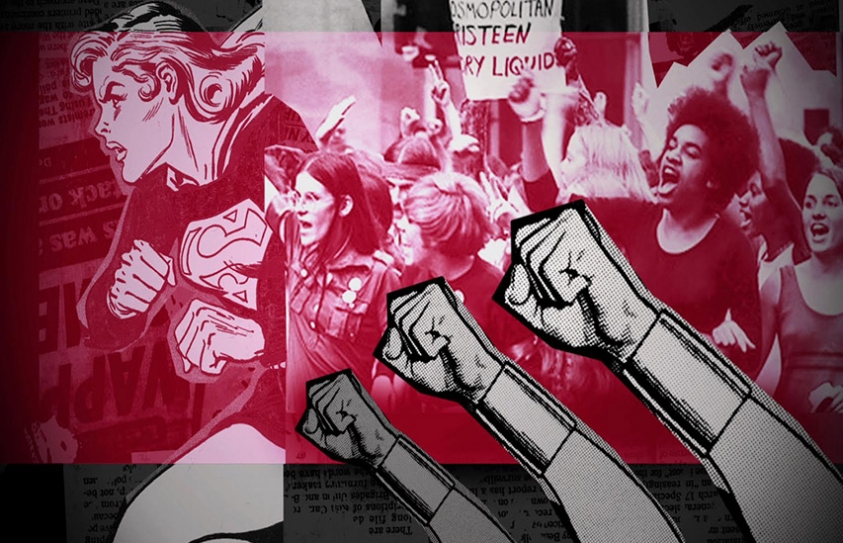
Why Women Don’t Run For Office
by Aakanksha Solanki July 7 2017, 3:51 pm Estimated Reading Time: 5 mins, 24 secs
A new survey sponsored by POLITICO WOMEN, American University and Loyola Marymount University, finds that the last election in the United States of America, has mobilized Democratic women to take political action. Democratic women are signing petitions and making donations at much higher rates than they did before the election. But the poll also shows that women across political parties remain significantly less likely than men to have thought about running for office.
What would it take to get more women to run?
POLITICO has examined the factors that dissuade women from running—starting at a young age and persisting over the course of their educations and careers—and the key moments when they could be urged to reconsider:
It’s demonstrated well that women can raise money and win elections as good as men do. And if not, a very few women actually run for the office. As a matter of fact women represent 20 percent of Congress, 25 percent of legislature seats and 12 percent of governorships. Also apart from that, there are 24 percent of statewide elected offices, such as attorney general and lieutenant governor.
Following graph shows the Gender Gap in Political Ambition
Women are much less likely than men to consider running for office.
Graph 1

Source: Survey of potential candidates conducted for POLITICO/American
University/Loyola Marymount University
When potential candidates who have considered running for office first thought about it?

Source: Survey of potential candidates conducted for POLITICO/American University/
Loyola Marymount University
T he discord begins at a very young age. It is found out that students who played varsity and junior varsity sports were much more likely to run for the office according to political scientists Jennifer Lawless and Richard Fox. This also depends on encouragement from family. A shocking research revealed that 25 percent women who have played varsity sports are more likely to show political inclinations.
Students who said they might want to run for political office someday:
BY SPORTS PARTICIPATION AND GENDER?

Source: Jennifer Lawless and Richard Fox, “Girls Just Wanna Not Run,” March 2013, Women and Politics Institute at American University
The gap really opens up when both boys and girls pursue higher education and go to college. Even though both the gender are encouraged to take part in political activities in conducted college, men are more likely to exhibit aspirations inclining towards politics and are equally encouraged by family and society for the same.
Students who reported being encouraged running for student government and for political office later in life
BY INFLUENCER AND STUDENT’S GENDER:

Source: Jennifer Lawless and Richard Fox, “Girls Just Wanna Not Run,” March 2013 report, Women and Politics Institute at American University
According to Lawless and Fox one of the key factors in deciding the person’s future are parents and thus parental encouragement plays an important role as well as an equalizer. Half of college students whose mothers regularly commended them to run for office have said that they would “definitely like to run in the future,” compared to only 3 percent among those who received no motherly encouragement.
POLITICAL CONFIDENCE AND EXPERIENCE AMONG WHO THINK?

Source: Jennifer Lawless and Richard Fox, “Not a ‘Year of the Woman’,” November 2014 report, Brookings Institution
It’s been noticed that women in college always lack of certainty. Whereas, men’s party-political drive cultivates according to Lawless and Fox. 68 percent of high school girls have never though of running for office and 26 percent doubt that they would ever be qualified to run, 27 percent the college women have the same doubts. Men in college who never even thought they’d be ever qualified to run for office were still 50 percent more than women considering sought of doubts. It’s also found that college men about politics amongst their peers and visit political websites than women. Also most the men join College Republicans or College Democrats.
STUDENTS WHO HAVE THOUGHT ABOUT RUNNING FOR OFFICE?

Note: Data are based on responses from 903 high school boys and 915 high school girls, all of who plan to attend college, and 1,020 college men and 1,095 college women. The gender gap is only statistically significant at p < .05 in all comparisons between college men and women.
Source: Jennifer Lawless and Richard Fox, “Not a ‘Year of the Woman’ and 2036 Doesn’t Look So Good Either,” November 2014, Brookings Institution
And this doesn’t just stop here, this insecurity continues even far beyond college in spite of women have political experience. When Lawless and Fox polled women and men among “feeder” careers such as business, law, education and politics/activism, the results were that women equally had relevant political experience, including extensive policy research, public speaking, soliciting funds and interacting with public officials. But being asked upon if they gave it a thought that they were qualified to run for office, only 57 percent women said they were qualified enough in comparison to 73 percent of men.
College students’ future aspirations and attitudes on how to create societal change were asked, “If you wanted to make your community or country a better place, which path would you be most likely to pursue?”

Source: Jennifer Lawless and Richard Fox, “Girls Just Wanna Not Run,” March 2013 report,
Women and Politics Institute at American University
It’s been observed that during recruitment process women’s responses are as good as men. But the report says that more men are being recommended to run by political operatives, colleagues and family members.
POTENTIAL CANDIDATES WHO REPORTED TO BEING ENCOURAGED TO RUNNING:

Source: Jennifer Lawless and Richard Fox, “Men Rule,” January 2012, Women and Politics Institute at American University
According to 2008 nationwide survey of county party leaders, for the party leader to continue to close the gap at the higher levels of office it is easiest for party leaders to continue recruiting women from local school boards, parent-teacher associations and other offices below the county level. Most county party leaders hire from the sub-county officeholders. But there are very less possibilities the recruit amongst education and child-related networks, especially where with untapped political potential are found.
COUNTY PARTY LEADERS LOOK FOR CANDIDATES IN THESE NETWORKS:

Note: “Party members and officeholders” includes people active in party and recommendations from current officeholders.
Source: Melody Crowder-Meyer, “Gendered Recruitment Without Trying,” November 2013, Politics and Gender





-173X130.jpg)
-173X130.jpg)
-173X130.jpg)
-173X130.jpg)
-173X130.jpg)
-173X130.jpg)
-173X130.jpg)